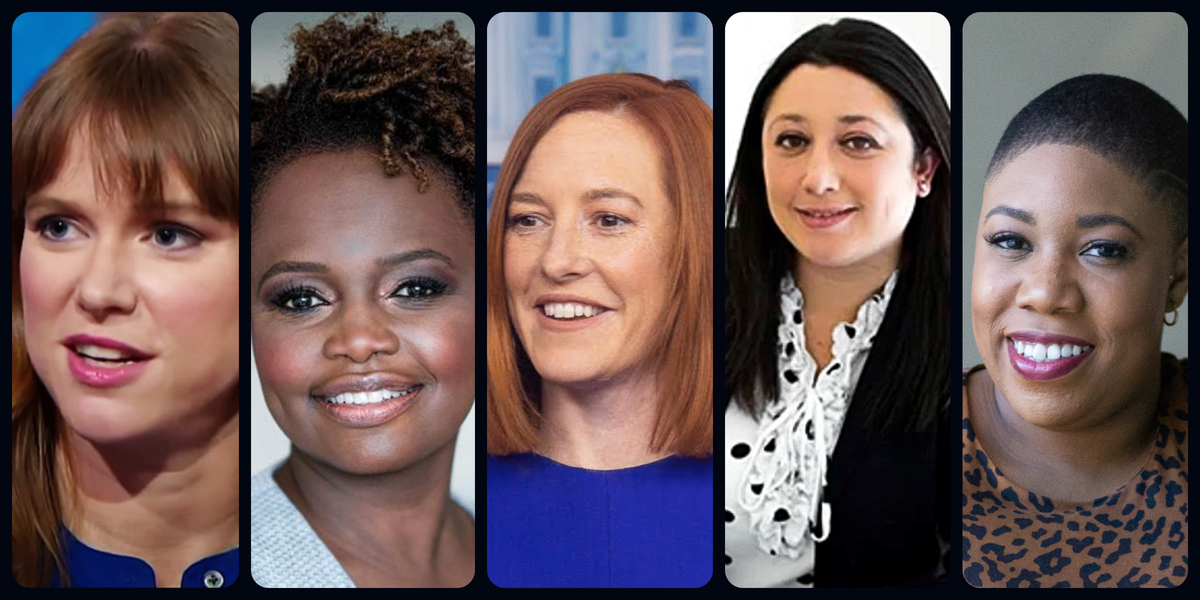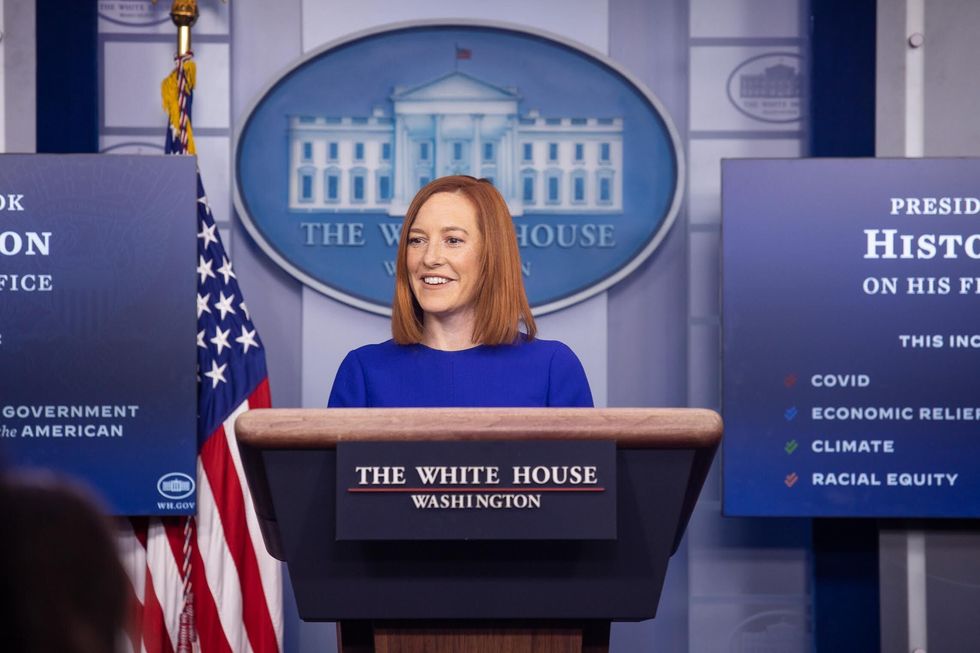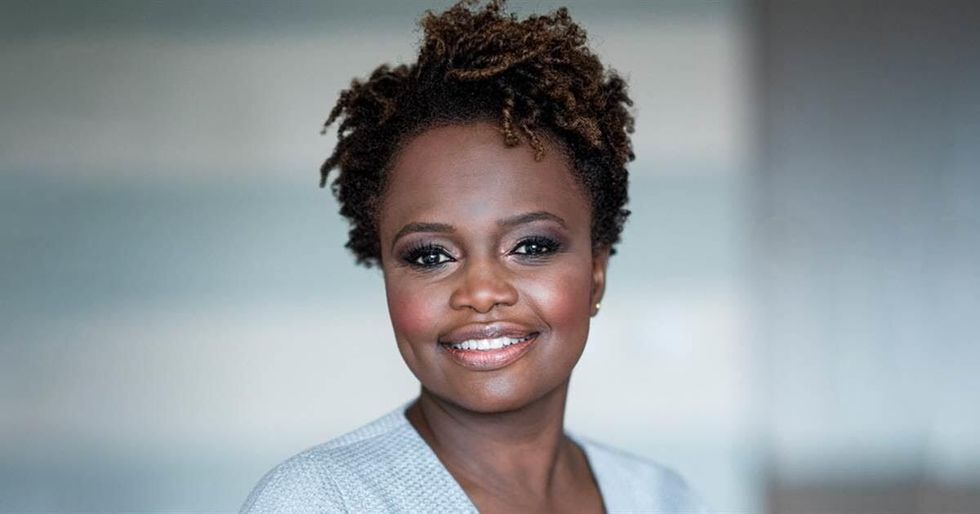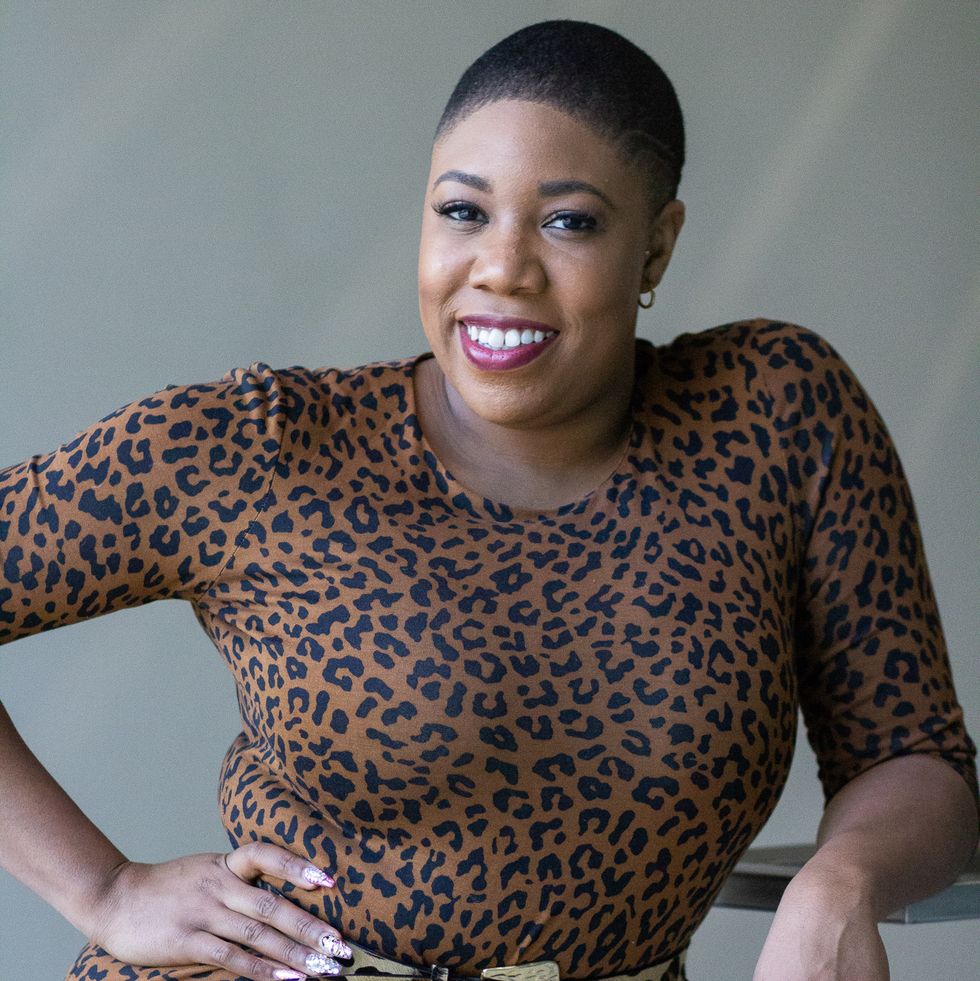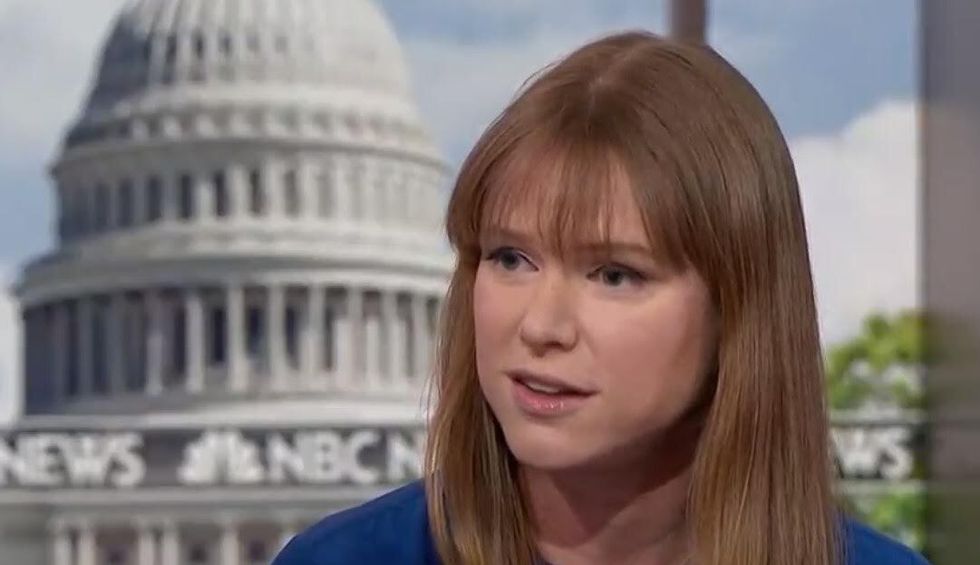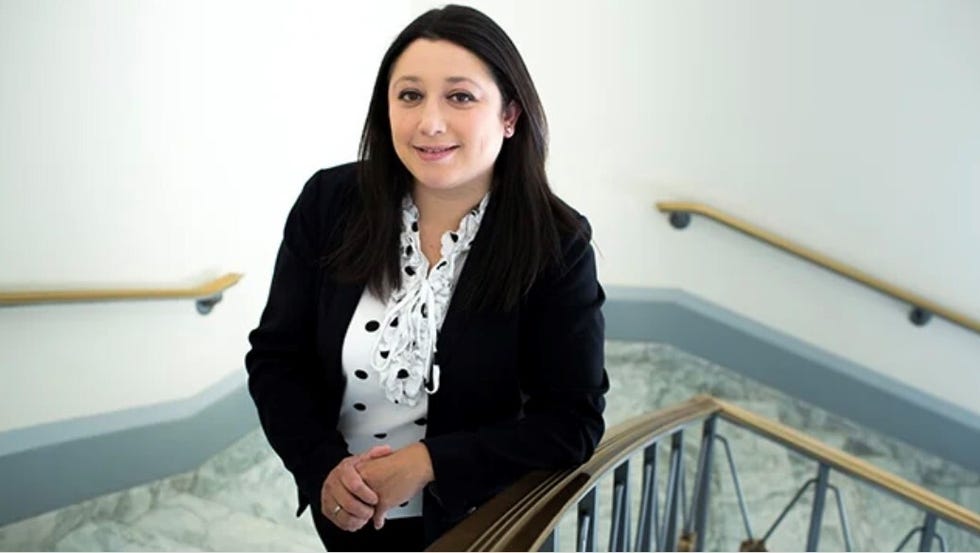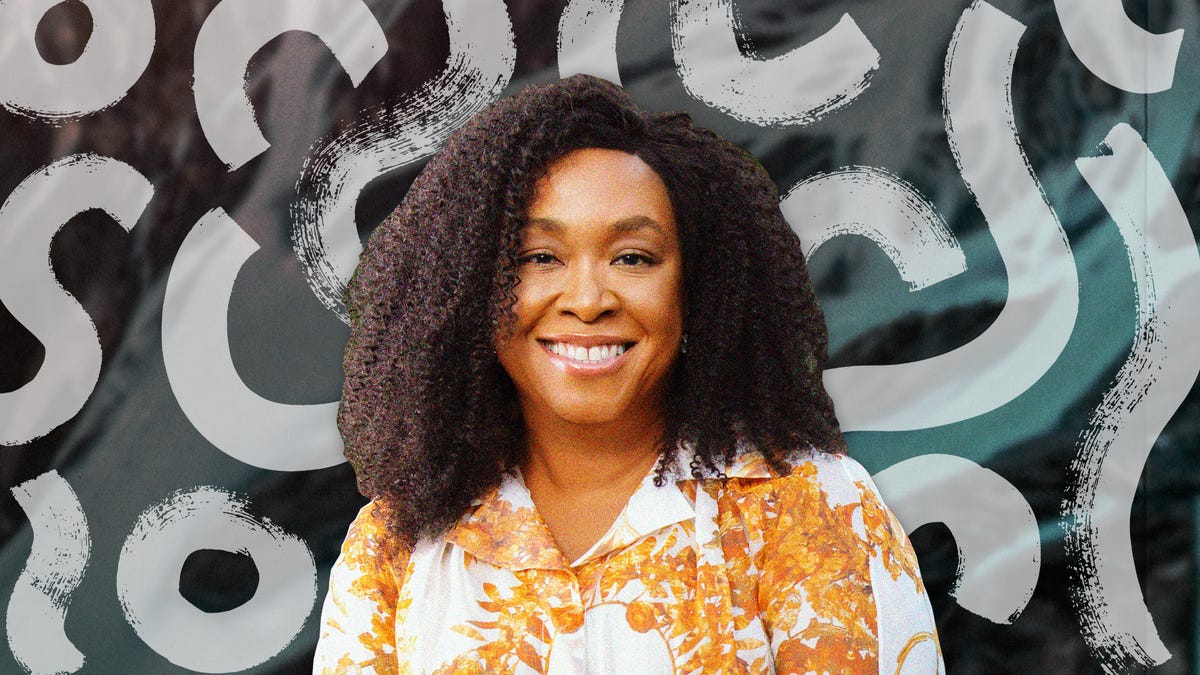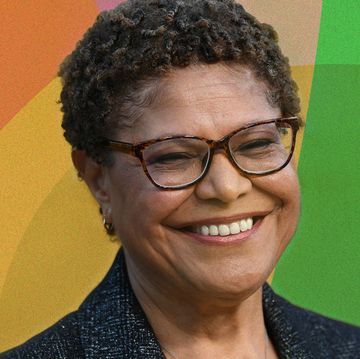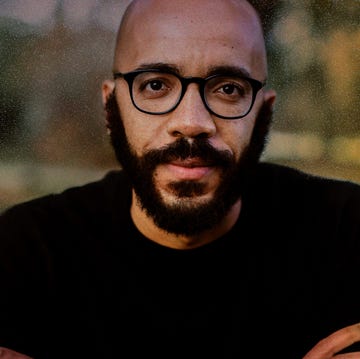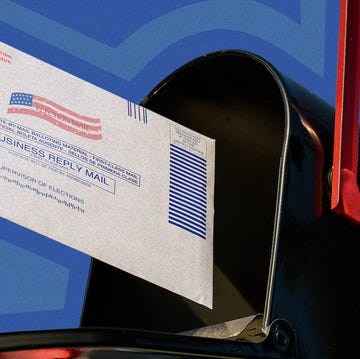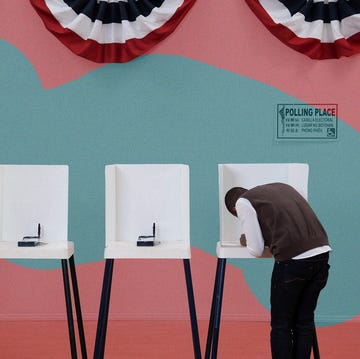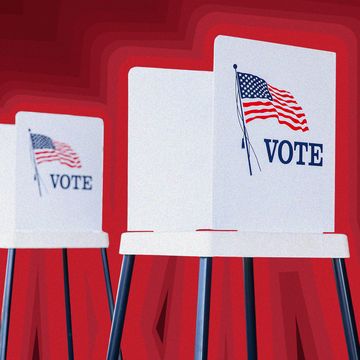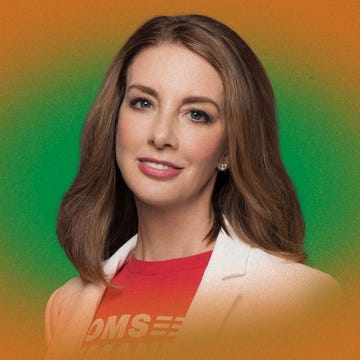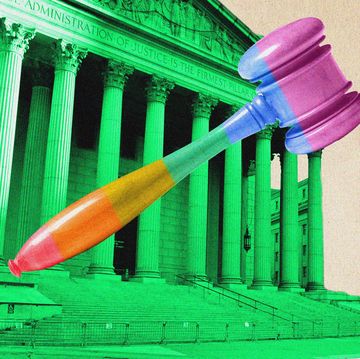On January 20, Joe Biden and Kamala Harris were sworn in as the 46th president and 49th vice president of the United States. Immediately after that historic moment, their communication department got to work immediately.
After all, there was quite a bit of damage control to do. Under the Trump administration, the press was regularly branded an enemy of the people, an attitude from the top that translated to unclear messaging, sporadic and tense press conferences, and an air of mutual distrust. This left Biden’s team with an unusual challenge: to establish a dedication to truth, transparency, and working relationship with journalists in the White House press corps and beyond. And for the first time ever, women comprise the entire senior team leading this sea change.
To celebrate this groundbreaking moment, and to draw back the curtain on what it takes to be a woman in politics, we spoke with Jen Psaki, Karine Jean-Pierre, Symone D. Sanders, Kate Bedingfield, and Pili Tobar about their road to the White House.
Jen Psaki, White House Press Secretary
Jen Psaki has previously served as the spokesperson for the United States Department of State, and the White House deputy communications director during the Obama administration. But on the evening of January 20, shortly after the inauguration, the Biden administration held its first press conference, where Psaki stepped into her new role as the White House Press Secretary. It was a tone-setter for what was to come.
“I have deep respect for the role of a free and independent press in our democracy and for the role all of you play,” Psaki told the assembled press, promising a return to daily briefings, which had virtually disappeared during the Trump administration. At one point, Trump shut down the practice for three hundred days.
It’s a tone of respect Psaki reiterated while speaking with Shondaland. They’re humans, doing their best — and her ultimate goal is to assist the press with informing the public.
“I think part of delivering on this promise that we are going to return stability and facts, and make policy hip again, is about thinking carefully about your actions but also about your words,” says Psaki. “If you mess up, you fess up, and then build from there. That's also part of being transparent and trying to communicate accurately and effectively with the public.”
On defining her role with President Biden:
“We talked a lot about the importance of tone, and ensuring that the way we're communicating to the public is fact-based, and is not escalatory… He also talked about foreign policy because we both love foreign policy. And he also said to me, at the end of the conversation, we were talking about my kids and he said, ‘Anyone who's worked for me for a long time will tell you that if you ever have anything you need to do with your kids, if they have a school event, or a doctor's appointment, you don't even need to ask. Just go do it.’ Family is so important to what we do, and if you come and do this job, that's how you should approach it.”
On her first press conference:
“We've all been through a trauma over the last several years. And it's important to convey not only that we respect the press, but also that there will be moments of disagreement, and there will be moments where there's a back and forth or things get heated. That doesn't mean that we disrespect the press. That’s in many ways democracy in action, the press pushing hard, that's their job. You can have substantive debates; you can have substantive discussions. And there can be moments where that becomes energized and that's okay. People can see that happening, and that is democracy working. But we are not attacking people personally. We're not attacking the rights of the media.”
The best part of her job:
“First, I get to learn new things every day. We did an announcement about a supply chain executive order. That sounds extremely nerdy, but it's really interesting. I get to talk to the people who were experts on it. Second is, I have a huge respect for what the media does. I came to this job from having served at the State Department and was the spokesperson there for a couple of years. And when you travel around the world, you see how media is treated in a range of countries — Russia, China, many other parts where there's suppression, there isn't freedom of speech or freedom of press. You have a different, an even greater value for the role of the media and the role of accountability. There are days where I know it's going to be a tough conversation, and you just have to kind of put your armor on and buckle up.”
Karine Jean-Pierre, Principal Deputy Press Secretary
Karine Jean-Pierre has worked as the regional political director for the White House Office of Political Affairs for the Obama administration, served as a cable network political analyst for MSNBC and NBC news, and has even written about her experience as an immigrant and entering politics in the moving memoir, Moving Forward: A Story of Hope, Hard Work, and the Promise of America. However, returning to the White House, this time in the role of the Deputy Press Secretary, has given Jean-Pierre a surreal reminder of just what’s possible.
“Walking through the West Wing, there's nothing like it,” she says. “Here I am, this Black woman immigrant, and I get to work at the White House. When I was younger, people said that I would not amount to much or amount to anything. And here I am getting to work at the White House for President Biden.”
On writing about herself:
“I think that is hard when you're making your life public and you're sharing things about yourself that you may not even have shared with others. It became a book where I wanted to help people. And I remember thinking, I hope this book helps a young person who might be thinking about getting into politics and has no idea how to do it, especially young women. I'm an immigrant and growing up in a household, there's a culture which is like, you have to be either a doctor, or a lawyer, or an engineer. I thought I was going to be a doctor but it wasn't really what I wanted to do. And along the way, as coming to age stories go, you're still trying to find yourself, trying to find out who you are, and your place in this world. And when I decided not to go to medical school, I was trying to figure out what's my passion. I've always wanted to help people always."
On getting to know President Biden:
“I traveled a lot with then Vice President Joe Biden. And I got to know him as a person. The first time I met him was on Air Force Two. And we were coming back from New Jersey…Then here comes Vice President Joe Biden, who does not have to sit with me, he has his own cabin. He comes out and decides to sit right next to me, and we just start talking. The ride might have been 40 minutes, and we talked the whole time. And I remember thinking: wow, what a wonderful human.”
On choosing to return to the White House:
“After the last four years, I just couldn't stay out of it. I could not stay out of helping elect Joe Biden, I could not stay out of being part of that, and doing everything that I can. And I did it because of him, but I also did it because of my daughter, who was six. She knows about presidents and she knows about President Obama and President Trump and all of that. But when she looks back to this time at 12-years-old and says, ‘Well mama, what did you do to help us get out of it?’ I want to be like, ‘I did everything that I could.’ I even jumped on the campaign for five months, I did that for her. I wanted to make sure that she was growing up in a world where she felt like, as a young woman of color who has two moms, that she felt safe, and that she felt like she can be proud of herself.”
Symone D. Sanders, Senior Advisor and Chief Spokesperson for the Vice President
As the Senior Advisor and Chief Spokesperson for the Vice President, Symone D. Sanders handles the lion’s share of communications for Vice President Harris. It’s a position that’s allowed her to draw on experience gleaned while working as national press secretary for Democratic presidential candidate Bernie Sanders, a Democratic strategist and CNN political commentator, and a senior advisor to Biden’s Presidential campaign. (It’s no wonder that in 2016, both Rolling Stone and Fusion highlighted her as one of the young Americans shaping that year’s election.) Now juggling such a full slate of duties, Sanders laughs at the idea that her career or job description could fit into a single elevator-pitch
“I work on statements, I work press stories all day long,” she says. “Sometimes I go on television to talk about the administration's work, and sometimes, specifically, the work of the Office of the Vice President. I sit in on meetings. I do a whole range of things. I like to say I do whatever needs to be done in service of the office.”
On Inauguration Day:
“When Joe Biden raised his hand, when Kamala Harris placed her hand, I just breathed a sigh of relief and I was so happy because I knew that these were two people who cared about what was happening to folks at America, [and] who are committed to fighting for them. We're committed to our democracy. It was just a really happy occasion because I had worked on the campaign so I know how long a road it was to get here. I really viewed it as I think many of us did, at the beginning of the work. Right after being sworn in, the President and Vice President got to work. The President was in the Oval Office, signing executive orders the Vice President was in the senate, swearing in three new members of the United States Senate and presiding over. I think it’s an accurate depiction of the Biden-Harris administration. It is about the work, it is about the people, and there is urgent action that needs to be taken, given the converging crises that we're dealing with. The President and Vice President are leading by example, having gotten right to work on day one.”
On dealing with crisis:
“These are unusual times, because the nation is dealing with a number of converging crises. You've heard the President and Vice President talk about economic crisis, and public health crisis, crisis of racial injustice, and a climate crisis. Maybe in simpler times, there will be one crisis per moment. But right now, there are four crises all at one time. And I think the vision that the President has laid out and that the Vice President is laid out, about how to address and tackle these crises, really cemented my belief that I've always thought that a Biden/Harris administration would save lives…I frankly view it as humbling to have this opportunity to serve, and do so on behalf of the American people. We are here to do the work of the people and the President and Vice President are constantly reminding us that that's really our charge and our mission.”
Advice for women interested in entering politics:
“I feel like this last election very clearly has laid out for us that who the President is matters, who the Vice President is matters, what the White House says absolutely matters. And I think that frankly, spaces in places are better when the breadth and diversity of the country is represented. So, that’s the voices of women. That means the voice of young people. That means the voices of people of color. That means the voices of folks from urban settings, but also rural areas. That means the voices of men. That means the voices of LGBTQ+ community. So, it is imperative that folks step up and they make their voices heard. Thank you, they engaged and get involved. Shirley Chisholm once said, ‘If they don't give you a seat at the table, bring a folding chair.’”
Kate Bedingfield, White House Communications Director
Kate Bedingfield oversees all the public communication that the White House does with the press, shaping the way the institution discusses issues, makes arguments, and connects with people, both on national and international levels. However, despite working as the director of response, and deputy director of media affairs in the Obama administration, as well as Biden’s deputy campaign manager, the honor of working for the White House still resonates.
“I will admit to crying a number of times during the swearing-in, because I was just so profoundly grateful for the experience that we all had together,” she says. “Working on this campaign and then also just for every person in this country who voted for Joe Biden and Kamala Harris and made this change happen."
On moving past the messaging of the previous administration:
“We think it's really important to reestablish that we are here, we're available, we're transparent, we're communicating clearly with the press — but also really ultimately with the people about what we're doing. And we're available to answer any questions. The other kind of big overarching thing that we try to do to help restore trust is to lead with science, to lead with data. We’ve gotten to a really difficult and ugly place in our public discourse, where people no longer agree on a common set of facts. So, we really try to think about what we're communicating on the President's priorities. How are we putting them forward? On data, how are we putting forward scientific facts? Are we putting forward economic facts? How can we do this in a way that reassures people that we're working from an established set of factors? You may not always agree with every decision we make or every argument we're making, but we're going to be making it from a place of truth and honesty."
On working with a historic, all-female team:
“It's interesting because it was not something that I thought a lot about as we were putting a team together, because we were thinking about who are the best people for these jobs? The people who either worked on the Biden campaign who've been integral, or who have worked in government in other senior roles who've been incredibly important. And so, it was sort of secondary after we put together the people that we thought were the right people. We looked around and said, this is an entirely women-led senior team — which is great.”
On the power of showing up:
“I always dreamed of a career in public service and in politics. I can't say that I ever imagined that I would have the opportunity to do a job like this. But I think one of the really great things about politics is if it is something you're interested in, you can volunteer for a campaign in your city, in your state. You can start to learn what the mechanics of campaigning looks like, just by literally showing up at a campaign office and saying, ‘I believe in this candidate, I want to work to try to get her elected or him elected.’ You learn in the field — which is what we call the program of going door to door and knocking on doors and getting on the phone and talking to people about your candidate. When I look at the trajectory of my career so far, what I'm really struck by is the great fortune of being able to get involved in something that means so much to people, just by showing up.”
Pili Tobar, White House Deputy Communications Director
Pili Tobar describes her job as making sure that the President's agenda is reaching the American people, and that they’re addressing readers and listeners in the “places where they are.” And while breaking through the noise of social media can be an uphill battle, the former aide to Senator Chuck Schumer turned White House Deputy Communications Director has already seen the power of clear, concise messaging.
“Some of the biggest challenges that we're running into is in terms of misinformation,” she says. “I think we've been pretty good at being clear and straightforward with the things that we are doing. Obviously, there's still an abundance of websites and places online where you will find things that are just simply not true. And so, I think it's something we continue to battle and that we're going to have to continue living in because it's the world that we live in right now.”
Why language matters:
“We need to talk to people where they are, we need to explain what it is that we are doing. Talk about Joe Biden's vision for America, how this is all becoming a reality. I think that's one of our priorities you saw from day one when Jen Psaki was at the podium, answering questions and restoring truth and honesty and transparency to that role and to that room, which unfortunately saw so many lies and so much disrespect with the previous administration. And so, that has to be our number one priority and goal, making sure that we are just being straightforward.”
On mentorship:
“It's something I've tried to do over time. Some of the people who I have mentored are doing really great and fantastic things, and there's nothing that I think [is] more rewarding than seeing that. I think it's important for women, and women of color specifically. It's like the whole idea that women never asked for a raise, women never pushed back and negotiate salary or things along those lines. Well, for women of color I would say it's probably even worse. It’s not that I've only mentored or worked with women of color, because that's not the case. But I think instilling some of that confidence and making sure that they feel comfortable with just being themselves and with being a little bit more assertive about things can go can a long way.”
On the power of a support system:
“I think this is important, and sometimes gets lost. All of these jobs are so hard. I think you can't do it without the support of people around you. And so, I think for me one thing that's really important is my wife and my daughter and their support. This is not something I would have been able to do without day-to-day sacrifices to make sure that I can continue doing this. And just the importance of, I think, recognizing that but also just making sure that you're being as receptive and as responsive to them as possible, even in the middle of such craziness.”
Laura Studarus is a Los Angeles-based travel writer with bylines at Fast Company, BBC Travel, and Thrillist. Sometimes she can go several hours without a cup of tea. Follow her adventures on Twitter.
Get Shondaland directly in your inbox: SUBSCRIBE TODAY
